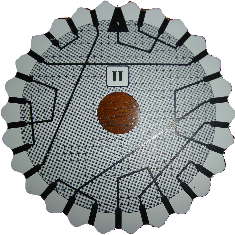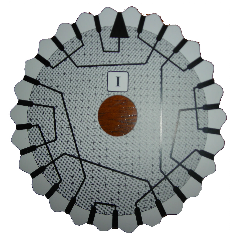Analysis of the Pocket Enigma Wheels
The wheels have no characters on them, just a lot of connections from one position to another.
One position has an arrow, or pointer, and is taken as the starting position (actually treated by the Python code as position 0 when pointing to “A”). It can be seen in the pictures that the connections simply connect from one character position to another, thus defining the substitution, or encoding, of one character as another.
Notice that this is symmetrical. So if a character is encoded as an “F”, then with the wheel in the same position encoding an “F” would return you the original character.
Wheel I
This wheel can be described by :
WHEEL1 = [-
So if the character at the pointer is “A” (the wheel is at position 0), an “A” would become “A-
Wheel II
Similarly , this wheel can be described by :
WHEEL2 = [2,2,-
Again, if the character at the pointer is “A” (the wheel is at position 0), with Wheel II an “A” would become “A+2”, which is “C”, while a “D” would become “D-




